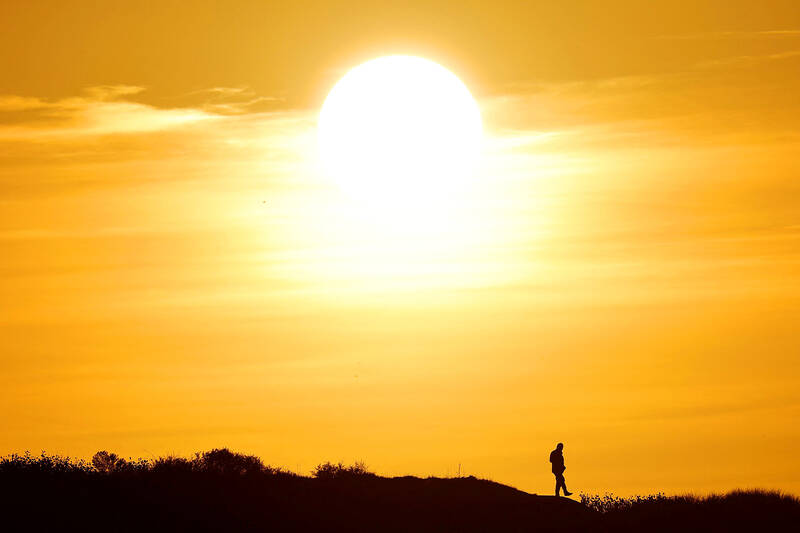Europe is set for a mild November, easing pressure on natural-gas storage as the region’s energy crunch restricts supplies ahead of winter.
Long-range outlooks from forecasters Maxar Technologies and Marex show no cold spells for the month — a relief for households worried about the cost of heating and for governments keen to preserve gas stocks following a slump in Russian supply.
“In terms of energy demand, the warm start to November would be a welcome sign given the current state of global energy,” said Matthew Dross, a meteorologist at Maxar. “Still, occasional bouts of cold air cannot be ruled out for November and the winter 2022-2023 season as a whole.”

Photo: Reuters
European gas prices have dropped significantly since peaking in August, but are still about 80 percent above year-ago levels. Market spikes have driven up costs for consumers and industry, with many bracing for eyewatering winter bills.
“Strong above-normal” temperatures are expected early this month, while mild weather will continue through the month, Dross said.
Other forecasters have suggested a possible return to average temperatures in the second half of this month.
Autumn in Europe has already been unseasonably warm, with last month registering the lowest number of “heating-degree days” since 2000, Dross said.
That has helped keep gas in storage facilities, which are now about 95 percent full across the continent, with Germany’s sites above target at almost 99 percent.
Germany’s national forecaster Deutscher Wetterdienst said the country’s current warm weather is set to continue, while France’s weather service also sees higher-than-usual temperatures persisting.
In the UK, the chances of a colder-than-normal winter are actually increasing, although the most likely scenario remains an average winter through next month, Britain’s Met Office said.
Lower-than-expected gas demand and declining prices — coupled with limited capacity to accommodate incoming cargoes of liquefied natural gas (LNG) — have already triggered greater use of floating storage. Traders globally are keeping their LNG shipments on vessels for longer — with record volumes at sea last month — in anticipation of higher prices later in the season.
“LNG carriers with an estimated worth of about US$2 billion are currently queuing to unload their cargo,” said Alexandre Fierro, a senior meteorologist and research analyst at Marex in London.
A warm November would be far from solving Europe’s energy problems, but a delayed start to the heating season would at least give policymakers some breathing room.
Moreover, if the region is spared a deep freeze this winter — as predicted by scientists at the Copernicus Climate Change Service — consumers might get welcome respite from the worst cost-of-living crisis in decades.

PRECARIOUS RELATIONS: Commentators in Saudi Arabia accuse the UAE of growing too bold, backing forces at odds with Saudi interests in various conflicts A Saudi Arabian media campaign targeting the United Arab Emirates (UAE) has deepened the Gulf’s worst row in years, stoking fears of a damaging fall-out in the financial heart of the Middle East. Fiery accusations of rights abuses and betrayal have circulated for weeks in state-run and social media after a brief conflict in Yemen, where Saudi airstrikes quelled an offensive by UAE-backed separatists. The United Arab Emirates is “investing in chaos and supporting secessionists” from Libya to Yemen and the Horn of Africa, Saudi Arabia’s al-Ekhbariya TV charged in a report this week. Such invective has been unheard of

US President Donald Trump on Saturday warned Canada that if it concludes a trade deal with China, he would impose a 100 percent tariff on all goods coming over the border. Relations between the US and its northern neighbor have been rocky since Trump returned to the White House a year ago, with spats over trade and Canadian Prime Minister Mark Carney decrying a “rupture” in the US-led global order. During a visit to Beijing earlier this month, Carney hailed a “new strategic partnership” with China that resulted in a “preliminary, but landmark trade agreement” to reduce tariffs — but

SCAM CLAMPDOWN: About 130 South Korean scam suspects have been sent home since October last year, and 60 more are still waiting for repatriation Dozens of South Koreans allegedly involved in online scams in Cambodia were yesterday returned to South Korea to face investigations in what was the largest group repatriation of Korean criminal suspects from abroad. The 73 South Korean suspects allegedly scammed fellow Koreans out of 48.6 billion won (US$33 million), South Korea said. Upon arrival in South Korea’s Incheon International Airport aboard a chartered plane, the suspects — 65 men and eight women — were sent to police stations. Local TV footage showed the suspects, in handcuffs and wearing masks, being escorted by police officers and boarding buses. They were among about 260 South

Chinese President Xi Jinping’s (習近平) purge of his most senior general is driven by his effort to both secure “total control” of his military and root out corruption, US Ambassador to China David Perdue said told Bloomberg Television yesterday. The probe into Zhang Youxia (張又俠), Xi’s second-in-command, announced over the weekend, is a “major development,” Perdue said, citing the family connections the vice chair of China’s apex military commission has with Xi. Chinese authorities said Zhang was being investigated for suspected serious discipline and law violations, without disclosing further details. “I take him at his word that there’s a corruption effort under